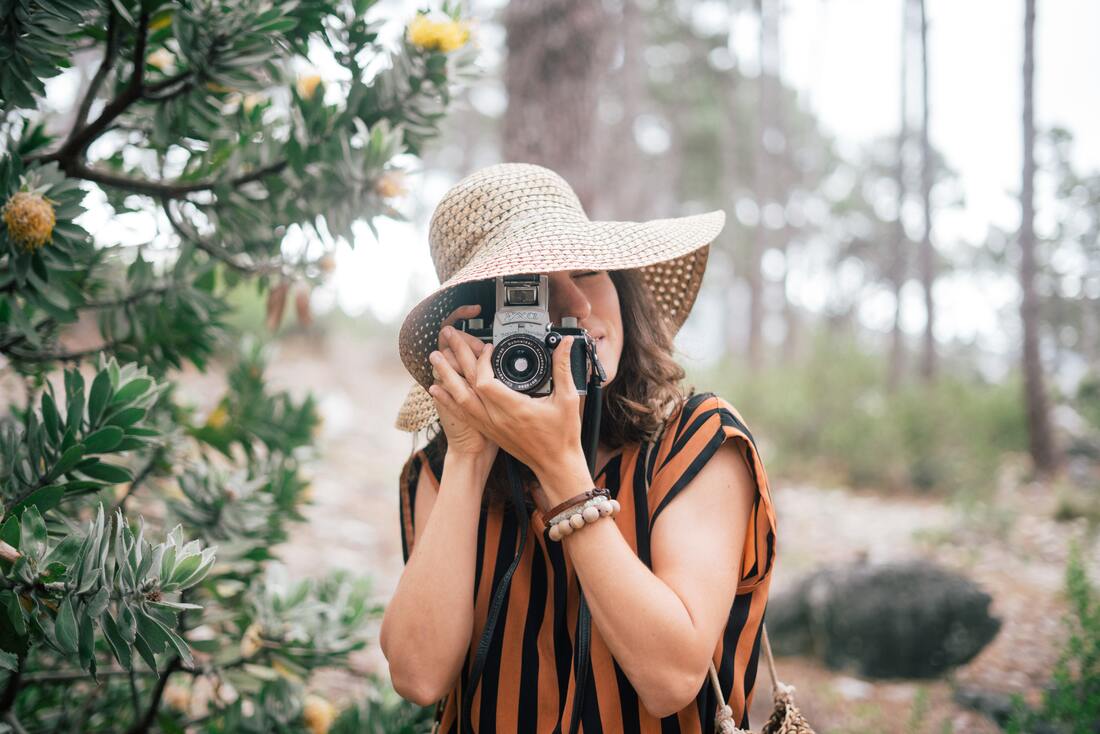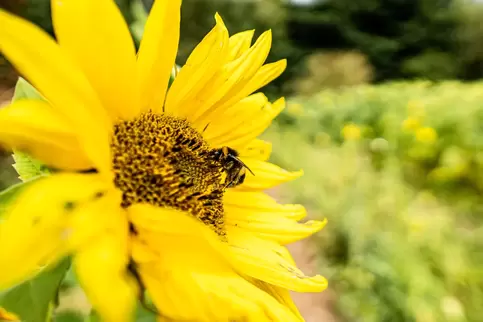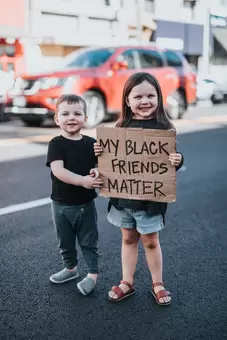 On this International Women's Day, let's take a moment to celebrate all women and girls who have influenced us to become who we are or whom we aspire to be. Our role models may include mothers and grandmothers, teachers and coaches, national and international figures, and even our own daughters but I hope that it can also include so many others who have somehow crossed our paths, young or old, living or not who have helped us reflect on ourselves, our purpose, and the energy or kindness that we put out into the world. It can give us new perspective to remember that our human connection is what makes us capable of resilience.
Though I'm reminded of several women who have been highlighted recently in the media because of their leadership roles advocating for gender and racial equity in education or art such as Malala Yousafzai or Jane Fonda, I'm particularly reflective today of a young woman named Courtney Yoder. I learned of her story on last night's 60 Minutes episode on the disparities of economic recovery during COVID. Courtney is 23 and has just had her first baby while navigating homelessness, hunger, and low-earning work. You can see the segment here. Had I not learned about some of her struggles, which included navigating the foster care system since she was 3 years old and thoughts of taking her own life when she couldn't find shelter, food, or income, I might have looked at her young, innocent, and sometimes smiling face and not given a deeper thought to the amount of inner strength, courage, and persistence that she had to summon just to be alive. It's very possible that if Courtney had not had to think about the welfare of her unborn baby, she may have given up all hope. I'm also reminded of Breonna Taylor and all the possibilities her life would have presented her had it not been cut short. Or the young woman who lost her fiance to COVID just before their wedding day who will never return to "normal" even at the end of this pandemic. Or the countless female doctors, nurses, grocery workers, who cannot take a day off. So, today, I hope we take time to think about not only the women who are near and dear or internationally known who have influenced us but also those whom we do not know who have somehow touched our humanity so that we may become better women in both our personal, professional, and civic lives. I hope that we can remember to be kind to each other, offer gratitude for what the day has offered us and what we have been able to offer, and always start with a kind word and thought toward our fellow human beings without negative judgement. We know not all of what each of us is carrying behind our smiles. I teach people how to uncover the wisdom they already carry to get new perspective on their parenting, health, and work with children and families. If you would like to feel less stressed, more confident, and happier in the way you parent, teach, lead, or live your life, GETnewperspective with me now. To your health! Dr. G. Photo by Luke Thornton on Unsplash I haven't written a blog post in a long while and I've been wanting to tell a story about teachable moments and making mistakes for many months. February is Black History Month and it seems fitting that I'm finally sitting down today (2/4/21) to tell this story.
During the summer, I was invited to write a column for my local newspaper on the topic of how to talk to children about racism and the pandemic. I had written about these subjects elsewhere on this blog before but not as one cohesive entry. I had to uncover a theme that could connect these two seemingly disparate topics. The concepts of persistence and resilience seemed to connect the two well, so I entitled the article Learning to Persevere: Talking to Children about the Pandemic and Racism. In it, I talk about simple life lessons I use in my parenting and professional development work, lessons I learned in my own Greek family and ones that can help guide families and individuals as we weather these stormy times. In the fall, I had recorded a special documentary on the life of Chadwick Boseman to be viewed later when I would have some time. I had become interested in learning more about this fine actor, as I had not known much, other than the fact that he starred in the film "Black Panther" and had recently lost his battle to colon cancer at the young age of 43. When I finally did play Robin Robert's ABC News Special: "Chadwick Boseman - A Tribute for a King," I walked away with many strong feelings. Some were associated with admiration and awe at a man whose strength and determination achieved so much in the last four years of his life, even while battling this unforgiving disease. Others dealt with sadness that he did not live longer to inspire more young people and do more good for our global community. Still others paralyzed me - they were feelings of dread and anger at myself for not having known an important fact I discovered only because I happened to watch this documentary. It turns out that one of the featured speakers on the special was Marc Lamont Hill, someone I had included in my article about racism and the pandemic. What I had not known while writing my article, and probably should have known, was that he was Dr. Marc Lamont Hill, a professor of media studies and urban education at Temple University. I had watched a piece on CBS News that showed a clip of him interviewing John Legend in the aftermath of George Floyd's death, where he was labeled a BET news personality, which also happens to be true. His words had inspired me to reflect more deeply on the distinction between hope and optimism and that's how I had infused him into my piece. This sort of misattribution by way of not fully rounding out his identity as a truly accomplished African-American academic, however, made me feel guilty for not having done any additional research before I included him in my narrative. I knew I had to fix that and fix it quickly but you know how it goes. The intensity of feeling slowly dissipates and then life happens and we don't do the things we've vowed to do. The truth is that I started writing this blog post in October but got interrupted and didn't go back to finish it, until now. The way this experience relates to parenting, child development, and reflective pedagogy is through teaching the significance of the adages "better late than never" and "always keep your word." It is never too late to own up to an error, whatever it may be. Making mistakes is how we learn, how we do better, how we develop a growth mindset at any age. I hope this story inspires you to start conversations with your loved ones about teachable moments. Some may seem small and insignificant but I guarantee you they can pollinate and shift perspectives that can last a lifetime. I teach people how to uncover the wisdom they already carry to get new perspective on their parenting, health, and work with children and families. If you would like to feel less stressed, more confident, and happier in the way you parent, teach, lead, or live your life, GETnewperspective with me now. To your health! Dr. G
Photo by Nathan Dumlao on Unsplash
We are living in sad, dangerous, but also hopeful times. Hope, I was reminded the other day by Marc Lamont Hill, a BET news anchor, is different than optimism. Optimism may be more idealistic in nature whereas hope intrinsically contains struggle in the context of progress, while on the path to positive change toward social justice. The death of George Floyd in recent days reminds us of the systemic and institutional racist beliefs and practices that are imbedded in American culture, whether we like it or not. That is the truth. But let’s not forget that we have come some way from segregation and Jim Crow to today, albeit slowly and painfully. Mr. Floyd in not the first African-American human being to die at the hands of police in modern society. Police brutality and racist policies in law enforcement are not new nor are they the only institutionalized policies that create and maintain white privilege. There is indeed generational trauma in black and brown families in this country as Massachusetts Representative Ayanna Pressley so eloquently described recently (she begins talking about 1 minute into the video clip), and until white parents and white adults fully see their privilege as a contributing factor and actively act to change that, we will never move toward equity under the law for all people. To get at equity under the law, we must also face inequity in health care, in housing, in education, in hiring practices, in all facets of society. This is why talking to children about racism right now through the lens of what is currently happening in the country is crucial. I’ve heard many scholars and others talk about the present time as a tipping or turning point in American culture and I agree. The largely peaceful protests that are occurring in major cities across the world are multi-generational and racially diverse, in contrast to the protests of the 1960s. All eyes, especially the eyes of young people, who do not fear seeing the truth can see what is plainly in front of them. Parents must seize the moment and begin or continue their conversation about racism in developmentally appropriate ways.
Several outlets have compiled wonderful resources for adults talking to children but also for white individuals’ own journeys toward understanding racism. I am listing some of my favorite compilations below and in addition want to highlight and add the works of: 1. Ibram X. Kendi and Jason Reynolds, especially Stamped from the Beginning: The Definitive History of Racist Ideas in America. For a 5-minute listen or read, check out this NPR story and 2. Waking Up White and Finding Myself in the Story of Race by Debby Irving, a poignant, insightful, and helpful book for exploring white privilege. The Children’s Trust Fund has compiled a wonderful list of varied resources below and I’d like to highlight those under the National Museum of African American History & Culture tab, though all are excellent:
The Isabella Gardner Museum has also compiled some reading resources here. Finally, Barnes & Noble has an extensive list of both children’s and adult books for talking about race, racism, and allyship. You can find them here. In order to be able to talk truthfully and openly to children about injustice, we must first start inward. I hope the above resources will help you and your family on your journey. I teach people how to uncover the wisdom they already carry to get new perspective on their parenting, health, and work with children and families. If you would like to feel less stressed, more confident, and happier in the way you parent, teach, lead, or live your life, GETnewperspective with me now. To your health! Dr. G. |
AuthorAnastasia Galanopoulos, Ph.D. Parent, Educator, Health Activist. A note about my signature. When I first started teaching at Wheelock College, one of my first students with whom I still keep contact, started referring to me as Dr. G. In the affectionate spirit of its tone, I adopt that nickname here. Archives
March 2021
Categories
All
|



 RSS Feed
RSS Feed